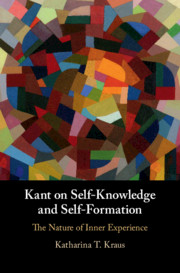Book contents
- Kant on Self-Knowledge and Self-Formation
- Kant on Self-Knowledge and Self-Formation
- Copyright page
- Dedication
- Epigraph
- Contents
- Figures
- Table
- Preface
- Introduction From Inner Experience to the Self-Formation of Psychological Persons
- Part I The Appearing Self
- Part II Self-Consciousness and the “I” of the Understanding
- Part III The Human Person and the Demands of Reason
- 5 The Guiding Thread of Inner Experience
- 6 The Demands of Theoretical Reason and Self-Knowledge
- 7 The Demands of Practical Reason and Self-Formation
- Epilogue Individuality and Wholeness
- Bibliography
- Index
7 - The Demands of Practical Reason and Self-Formation
from Part III - The Human Person and the Demands of Reason
Published online by Cambridge University Press: 01 December 2020
- Kant on Self-Knowledge and Self-Formation
- Kant on Self-Knowledge and Self-Formation
- Copyright page
- Dedication
- Epigraph
- Contents
- Figures
- Table
- Preface
- Introduction From Inner Experience to the Self-Formation of Psychological Persons
- Part I The Appearing Self
- Part II Self-Consciousness and the “I” of the Understanding
- Part III The Human Person and the Demands of Reason
- 5 The Guiding Thread of Inner Experience
- 6 The Demands of Theoretical Reason and Self-Knowledge
- 7 The Demands of Practical Reason and Self-Formation
- Epilogue Individuality and Wholeness
- Bibliography
- Index
Summary
Chapter 7, “The Demands of Practical Reason and Self-Formation”, completes Kant’s account of psychological personhood by showing that the idea of the soul defines the unifying form of a person’s mental life. It finally establishes the self-formation view via the second central thesis that psychological persons first form themselves in the course of realizing their mental capacities under the normative guidance of a unifying idea. The idea of the soul demands, for instance, that we realize ourselves as unified across time (according to the presupposition of substantiality), as the self-efficacious common cause of all mental activity (according to the presupposition of a fundamental power), and as self-directing towards a rational personality (according to the presupposition of personal identity). The chapter explicates the intrinsic normativity of personhood in terms of a demand for inner systematicity across three distinct, though interrelated spheres: the epistemic, the practical, and the affective. This demand is finally articulated in the form of two imperatives: the imperative of self-formation and the imperative of self-knowledge.
Keywords
- Type
- Chapter
- Information
- Kant on Self-Knowledge and Self-FormationThe Nature of Inner Experience, pp. 251 - 276Publisher: Cambridge University PressPrint publication year: 2020

